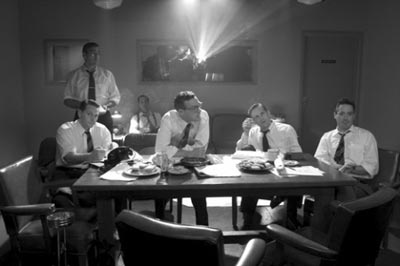Good Night, And Good Luck
Thin on character but thick on focus, Clooney sophomore effort gives plenty of food for thought.

Well now. Is it just me, or is George Clooney a man on an anti-Bush mission? While the forthcoming Syriana assaults the George W. Administration along the front of contemporary concerns, a more intriguing film by far is the Cloonster's second movie as director after the entirely acceptable Confessions Of A Dangerous Mind. Intriguing because it parallels Bush's current scare tactics in the War On Terror? with the 50s anti-Commie rhetoric of one Senator Joseph McCarthy, Good Night, And Good Luck deals with subject matter that few average cinema patrons are going to be all that familiar with. It's perhaps sadly indicative of the times when this, rather than the movie's stealth attack on current political affairs, is considered a risk, but for those in the know (and here at theOneliner we looooooves us some McCarthy) GNGL delivers an interesting if slightly two dimensional slice of entertainment.
For those who need some bringing up to speed, the movie deals with the war of words that erupted in the early 50s between Junior Senator McCarthy, then at the height of his Pinko-bashing propaganda torrent, and Edward R. Murrow (played brilliantly by David Strathairn), presenter of the CBS network's See It Now political affairs program. At a time when few Americans dared speak the slightest of words against McCarthy or his Wisconsin cronies for fear of being labeled a Red, Murrow, a man of undeniable intelligence and clarity of thought, dared to question the Senator's thinking and motives using his nationally broadcast TV show as a platform for debate. Backed by his producer Fred Friendly (Clooney), Murrow challenged the Senator on several issues, most importantly the unwarranted and evidence-devoid persecution of humble American Civil Servants who were dragged through the courts without trial, and GNGL charts this struggle from the perspective of the CBS team.
Famed for his intelligent yet no holds barred approach, Clooney wisely steers clear of evangelising Murrow in favour of eliciting a quiet and considered performance from his lead man that maintains some air of balance in an otherwise one-sided view on the affairs. Surrounded by a strong supporting cast portraying his colleagues that includes Robert Downey Jnr., Patricia Clarkson, Jeff Daniels and Frank Langella, Strathairn shines the brightest in a turn that has already earned him a Golden Globes nomination and should, rightly, afford him the same shot at an Oscar. If there's any criticism to be leveled at the characterization in general it's certainly not for the want of the cast, but rather Clooney and co-writer Grant Heslov's script that, while entertaining and informative, pays scant regard to character development. While Strathairn oozes chain-smoking charisma he is at least afforded the kind of screen time to imply some depth that the other characters lack.

The two attempts made here at substantially fleshing characters (Ray Wise as the tragic Don Hollenbeck and the pairing of Downey Jnr. and Clarkson) serve better to highlight the harsh personal ramifications of McCarthy's propaganda and the internal politics of 50s TV respectively than to actually add much depth to the persons involved, and at a touch over 90 minutes GNGL is one movie where this reviewer actually wished the running time were added to substantially. There's certainly the material and talent to have supported a touch more emotional gravitas, but if Clooney's wish was merely to produce a political conversation starter then he has surely achieved that much. It's perhaps just a shame that with the wealth of resources the history of this conflict potentially affords so little seems to have been achieved by way of personal exploration.
Mind you, if the characterisation doesn't quite enthrall then the production design and atmosphere Clooney captures is bordering on blissful. The Golden Era ambience virtually seeps from every part of the picture in a fashion that makes every frame of film a potential noir poster, and the overall tone is sufficiently engaging as to offer some counterweight to the aforementioned lack of depth. A slew of suitably smoky jazz compositions by Clooney's musician aunt Rosemary compliment the look wonderfully and bolster the aura no end, the overall effect being an undeniably tight production created, no doubt, on an even tighter budget. Era authenticity is lent by use of actual archive footage in several news segments, most notably of McCarthy's own recorded response to Murrow's invitation that he approach the show for the chance to rebuke the production team's argument, and it's the small touches like this that stitch together and help sell the final product.
If you have no interest in politics either past or present then it's doubtful how much you'll take from GNGL, with it's emphasis far more on comment than content. Clooney's intentions are indeed admirable and he has approached the project from precisely the right, understated angle, though no doubt not so much as to escape the radar of the Bush administration. Mind you, with no direct inference of this picture relating to current affairs the director has sidestepped a Michael Moore-like lashing in the press, although given the success of that, less deserving movie, maybe Clooney's effort could have benefited from some greater press exposure. Still, with 4 Golden Globe nominations behind it and the promise of at least a couple of Oscar nods this has the kind of industry legitimacy that Moore's last effort did not, and with any luck the buzz will serve it well. Well worth a look-in.
I award this movie 4 out of 5 Pinko Praise Units
George Clooney (Fred Friendly)
Robert Downey Jnr. (Joe Wershba)
Patricia Clarkson (Shirley Wershba)
Senator Joseph McCarthy (Man Afraid Of Colour Red)